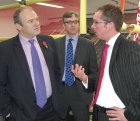Secretary of State visits Green Deal college

Ed Davey, Secretary of State for Energy & Climate, recently visited Oldham College to meet the team running the Government-approved training scheme for Green Deal advisors. He saw the training facilities for renewable technologies, which includes the latest HVAC equipment supplied by LG. His visit coincided with the announcement of the domestic section of the Green Deal.
Oldham College is an approved training provider that teaches the skills businesses need to benefit from the Green Deal.
LG has supplied energy-efficient products for the training facility at the Green Technology Centre. Richard Scott, LG’s main point of contact with the college, says, ‘LG’s commitment to Oldham College is ongoing, and the construction, now well under way, of a new innovation centre, will house a fully equipped LG Academy. It is a logical step, underlining LG’s commitment to producing quality “green” products and training in these new technologies.’
Students will be able to get hands-on experience working on the latest technology, including LG’s Thermal-V air-to-water heat pump and the Hydro Kit solution for heating and hot water.








